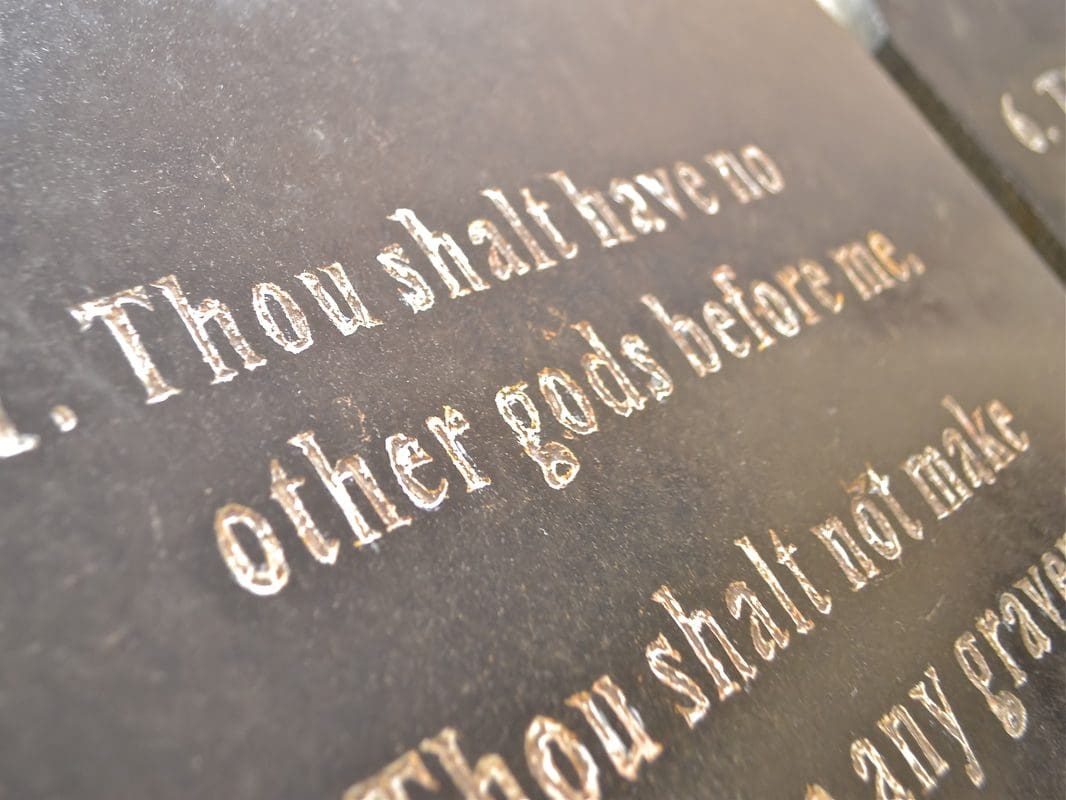
The Hike
Law
Exodus 19:16–20:21

It must have been a strange feeling for Moses to return to the place where God had spoken to him out of the burning bush. On his first visit, he was surrounded by a flock of sheep. Now he was surrounded by two million people. God had been faithful, and in one of the greatest miracles in the Old Testament, He delivered His people from Egypt and brought them to Mount Sinai.
Barriers, or “limits” (Exodus 19:12, 23), were set up as a kind of exclusion zone at the base of the mountain that was “wrapped in smoke because the LORD had descended on it in fire” (19:18). The whole mountain trembled violently, and the sound of the trumpet grew louder and louder. God was coming down to give His laws to the people.
A New Expression of God’s Grace
The law of God was never a ladder for unsaved people to climb up to heaven. It was always a pattern of life for God’s people who had been saved from judgment by the blood of the Lamb. That’s why the Ten Commandments begin with God reminding His people, “I am the LORD your God, who brought you out of the land of Egypt, out of the house of slavery” (20:2).
God was not saying, “I’m giving you these commandments so that by keeping them you may become My people.” He was saying, “I am giving you these commandments because you already are My people.” The commandments are not telling you what you must do to be saved. They are mapping out the life to which God calls you when He saves you by grace, through faith in the Lord Jesus Christ.
A Glimpse of the Glory of God
The Ten Commandments are not an arbitrary set of rules. They are a direct reflection of the character of God.
In the New Testament, sin is defined as falling short of the glory of God and as breaking the law (Romans 3:23; 1 John 3:4). Putting these two together, we may reasonably conclude that the law is an expression of God’s glory.
Why should you not commit adultery? Because God is faithful. Why should you not steal? Because God can be trusted. Why should you not lie? Because God speaks the truth. Why should you not covet? Because God is at peace and content in Himself.
When God says, “You shall have no other gods before me” (Exodus 20:3), it is because He is the only God. There is no one else like Him. And when God commands that we rest on one day of the week, it is because He rested from His work on the seventh day.
God’s commands were given to His own redeemed people. If you belong to Him, they are for you. God says to you, “You are mine, so model your life on who I am, and this is what a godly life looks like.”
A Mirror Reflecting the Love of God
God is love, and the Ten Commandments spell out what a life of love looks like. Our Lord Jesus was asked on one occasion, “Which is the great commandment in the Law?” (Matthew 22:36). Instead of picking one, Jesus wrapped them all together and said, “You shall love the Lord your God with all your heart and with all your soul and with all your mind. This is the great and first commandment. And a second is like it: You shall love your neighbor as yourself” (Matthew 22:37–39).
What does a life of love look like in practice? The Ten Commandments give the answer. The first four commandments tell us what loving God looks like:
1. You have no other gods before the Lord.
2. You don’t make an image. You love God as He is, not as you would like or imagine Him to be.
3. You honor God’s name, and never use it in vain.
4. You give God time—time to worship, time to serve, and time to remember that ahead of you is a vast eternity for which you must prepare.
The last six commandments tell us what it means to love your neighbor as yourself:
5. It starts at home with the first people God puts in your life: honor your father and mother.
6. It means you revere human life as a sacred gift of God.
7. It means that you are faithful to your spouse
8. It means you can be trusted not to take advantage of the weakness and vulnerability of others.
9. It means that you are true to your word and that your word is true.
10. It means that you rejoice in what God has given to others, rather than coveting what He gave to others for yourself.
The Ten Commandments are a mirror reflecting the glory of God. God is love, and He calls us to reflect who He is. What that looks like is spelled out in the Ten Commandments.
An X-ray of the Soul
I remember a visit to the dentist that I’d been putting off for a long time, mainly because I had no pain. The experience was not encouraging.
My dentist took some X-rays and then held them up to the light. “Mmmm… Oh dear!… Nasty. There’s a lot of decay underneath these fillings,” he said.
“But I have no pain,” I insisted. He didn’t seem impressed. “You’re going to need some pretty major work,” he said, “and the sooner, the better.”
Many people go through life with no sense of pain over their spiritual condition. They make the false assumption that things are well with them and that, having lived generally respectable lives, they are in good spiritual shape. But God’s law is like an X-ray of the soul. It shows us that we are people who find it difficult to let God be God, and that it is natural for us to love ourselves more than other people.
The first reason you need Jesus Christ is not that you’ll have a richer, fuller, and more satisfying life. It is that you are a sinner by nature and by practice. The X-ray of God’s law shows it.
The law is a good thing, just as X-rays are good, even if they bring us bad news. I didn’t like the news at the dentist, but I was grateful to know about the problem before it got worse. If you don’t know there’s a problem, you won’t pursue the remedy.
Jesus made it clear that the commandments go deeper than our actions. They search out the thoughts and intentions of our hearts. “You have heard that it was said, ‘You shall not commit adultery.’ But I say to you that everyone who looks at a woman with lustful intent has already committed adultery with her in his heart” (Matthew 5:27–28).
A proper understanding of the Ten Commandments will lead you to faith in Jesus Christ (Galatians 3:24). If the law has not yet brought you to Christ, you have missed its greatest purpose. That was the point of Jesus’ statement to the Pharisees: “You search the Scriptures… yet you refuse to come to me” (John 5:39–40). They were busy studying the law, but they missed the whole point, which was to show them their need for Christ.
Laying Track for the Train
The Old Testament story makes it clear that God’s people were not able to keep His law. The law tells us what to do, but it doesn’t give us the power to do it.
Later in the Bible story, God promised a new covenant in which He would not only tell us what to do but also give us the power to move in that direction: “I will put my Spirit within you, and cause you to walk in my statutes and be careful to obey my rules” (Ezekiel 36:27).
God’s law is like track for the train. The track gives direction, but the train won’t move forward unless there is power in the engine. And it is the special work of the Holy Spirit to give God’s people power to move in the direction that is laid out for us in God’s law.
Turning Commands into Promises
There’s a great story about a man serving time in prison because he was a thief.1 Stealing was his way of life, until the long arm of the law caught up with him. During his time in prison, he heard the good news of Jesus Christ and was wonderfully converted.
When the time came for his release, the man knew that he would face a great struggle. Most of his old friends were thieves, and it would not be easy for him to break the pattern of his old way of life.
On the first Sunday of his new freedom, he slipped into a church building. The Ten Commandments were inscribed on a plaque at the front, and his eyes were immediately drawn to the words of the command that seemed to condemn him: “You shall not steal.”
That’s the last thing that I need, he thought to himself. I know my weakness. I know my failure, and I know the battle I’m going to have.
As the service progressed, he kept looking at the plaque. And as he reread the words, they seemed to take on a new meaning. Previously he had read these words in the tone of a condemning command: “You shall not steal!” But now it seemed that God was speaking these same words to him as a liberating promise: “You shall not steal!” The man was a new person in Christ, and God was promising that the Holy Spirit would make it possible for him to overcome his old way of life.
When you believe in the Lord Jesus Christ, God will give you His Holy Spirit so that you can live a life that is pleasing to Him. His power will make the difference between a struggle in which you are destined for defeat and a battle in which you will have ultimate victory. The law tells you how God wants you to live. Jesus Christ makes this life possible.
Opened
The law is a mirror that exposes the hidden sins of our lives. Properly understood, it will convict us of our need for a savior and bring us to Christ. And when the Holy Spirit lives in us, the law is no longer a list of impossible demands but a description of new possibilities.
Notes:
1. I heard the story from my friend Charles Price, and am grateful for his permission to use it. See Charles Price, Matthew: Can Anything Good Come Out of Nazareth? (Fearn, Scotland: Christian Focus, 1998), 88.
Exodus 19:16–20:21
16 On the morning of the third day there were thunders and lightnings and a thick cloud on the mountain and a very loud trumpet blast, so that all the people in the camp trembled.
17 Then Moses brought the people out of the camp to meet God, and they took their stand at the foot of the mountain. 18 Now Mount Sinai was wrapped in smoke because the LORD had descended on it in fire. The smoke of it went up like the smoke of a kiln, and the whole mountain trembled greatly. 19 And as the sound of the trumpet grew louder and louder, Moses spoke, and God answered him in thunder. 20 The LORD came down on Mount Sinai, to the top of the mountain. And the LORD called Moses to the top of the mountain, and Moses went up.
21 And the LORD said to Moses, “Go down and warn the people, lest they break through to the LORD to look and many of them perish. 22 Also let the priests who come near to the LORD consecrate themselves, lest the LORD break out against them.” 23 And Moses said to the LORD, “The people cannot come up to Mount Sinai, for you yourself warned us, saying, ‘Set limits around the mountain and consecrate it.’” 24 And the LORD said to him, “Go down, and come up bringing Aaron with you. But do not let the priests and the people break through to come up to the LORD, lest he break out against them.” 25 So Moses went down to the people and told them.
The Ten Commandments
1 And God spoke all these words, saying,
2 “I am the LORD your God, who brought you out of the land of Egypt, out of the house of slavery.
3 “You shall have no other gods before me.
4 “You shall not make for yourself a carved image, or any likeness of anything that is in heaven above, or that is in the earth beneath, or that is in the water under the earth. 5 You shall not bow down to them or serve them, for I the LORD your God am a jealous God, visiting the iniquity of the fathers on the children to the third and the fourth generation of those who hate me, 6 but showing steadfast love to thousands of those who love me and keep my commandments.
7 “You shall not take the name of the LORD your God in vain, for the LORD will not hold him guiltless who takes his name in vain.
8 “Remember the Sabbath day, to keep it holy. 9 Six days you shall labor, and do all your work, 10 but the seventh day is a Sabbath to the LORD your God. On it you shall not do any work, you, or your son, or your daughter, your male servant, or your female servant, or your livestock, or the sojourner who is within your gates. 11 For in six days the LORD made heaven and earth, the sea, and all that is in them, and rested on the seventh day. Therefore the LORD blessed the Sabbath day and made it holy.
12 “Honor your father and your mother, that your days may be long in the land that the LORD your God is giving you.
13 “You shall not murder.
14 “You shall not commit adultery.
15 “You shall not steal.
16 “You shall not bear false witness against your neighbor.
17 “You shall not covet your neighbor’s house; you shall not covet your neighbor’s wife, or his male servant, or his female servant, or his ox, or his donkey, or anything that is your neighbor’s.”
18 Now when all the people saw the thunder and the flashes of lightning and the sound of the trumpet and the mountain smoking, the people were afraid and trembled, and they stood far off 19 and said to Moses, “You speak to us, and we will listen; but do not let God speak to us, lest we die.” 20 Moses said to the people, “Do not fear, for God has come to test you, that the fear of him may be before you, that you may not sin.” 21 The people stood far off, while Moses drew near to the thick darkness where God was.
(ESV)
Use these questions to further engage with God's Word. Discuss them with another person or use them as personal reflection questions.
Take the First Step to Open Your Bible
Join 35,000+ people who get ‘Open Today’. Every Wednesday you’ll get resources designed to inspire, encourage, and challenge you in opening your Bible.

